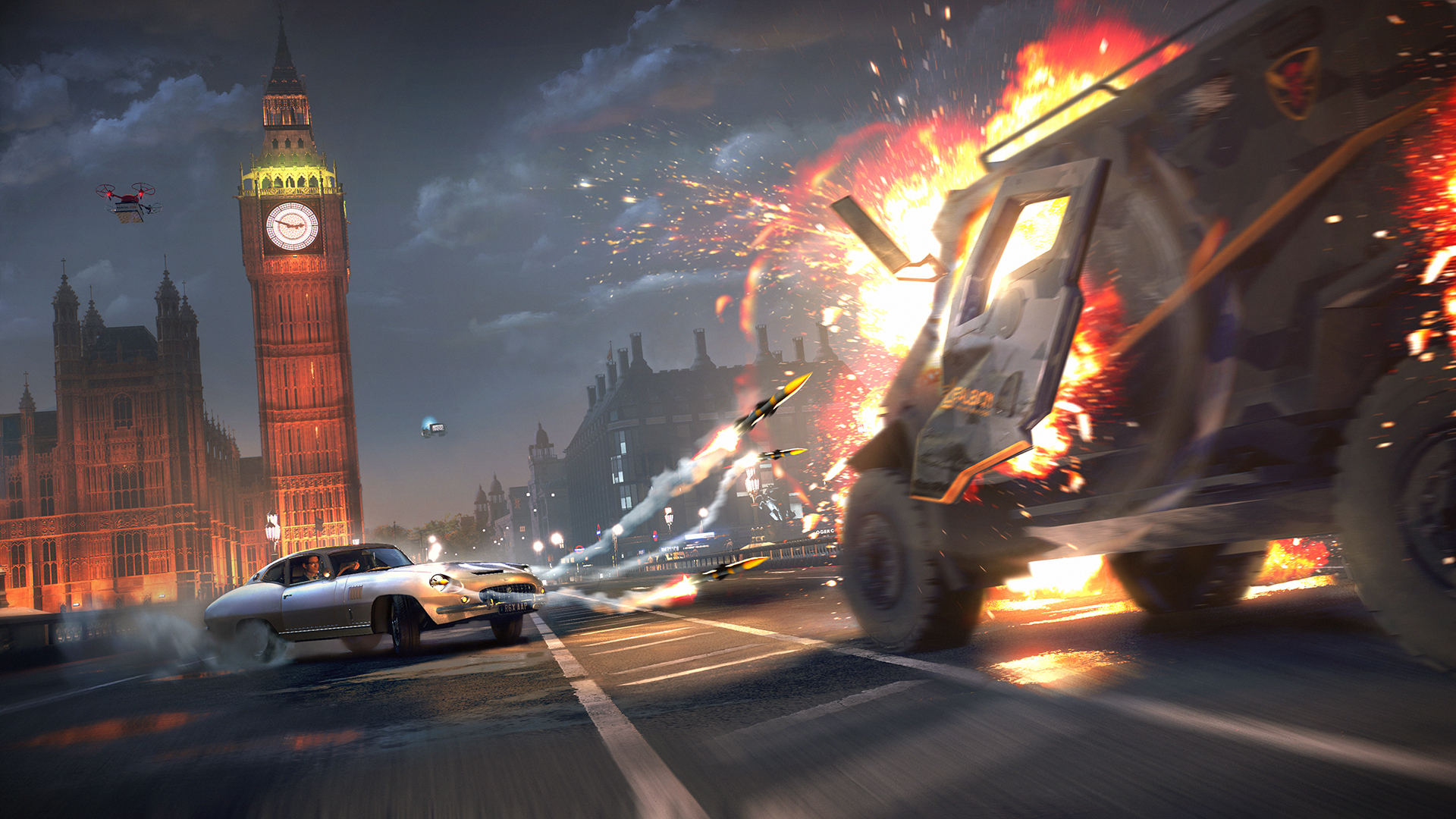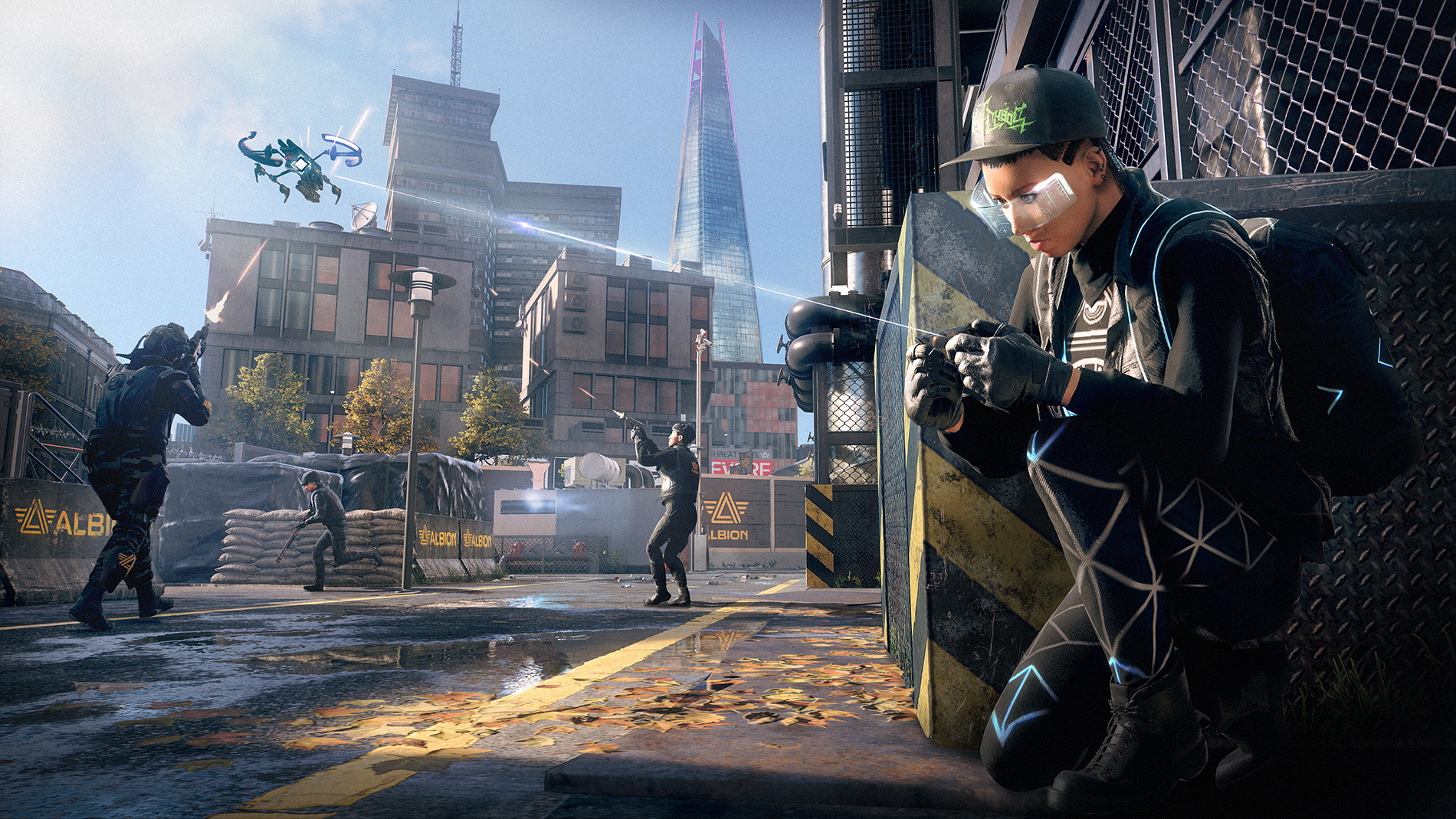Playing as anyone in Watch Dogs: Legion makes missions feel like movie heists
With a city full of citizens to recruit, Legion could bring new meaning to the term "ragtag group of misfits."
VIDEO: Watch Dogs: Legion hands-on gameplay preview, also on YouTube
Watch Dogs: Legion is bringing new meaning to the "ragtag group of misfits" cliche. With no traditional protagonist in Legion, I'm playing as a collection of random London citizens that I can swap back and forth between whenever I want. My team includes a construction worker who wears a reflective vest and carries around a giant wrench, a hacker who remote controls a cute little spider-like robot, and an ambulance driver whose most interesting ability, as far as I can tell, is that he can play the guitar.
It feels more like I've put together a book club or a weekly board game group than a team of dangerous, shadowy operatives who are going to take back London from the oppressive forces of evil. And I love that. It's a fresh approach to hero building (and hopefully storytelling) in a game that otherwise felt pretty familiar during the three hours I played last week.
In Legion you're free to approach any citizen you see in the world and recruit them to the hacker collective DedSec, though typically you'll need to do them a little favor first. To enlist my guitar-playing ambulance driver, for example, I needed to first recover a bunch of stolen human organs that were going to be sold on the black market. A lawyer I recruited had his ADHD medication stolen by two gang members, so I had to hack the goons' phones to learn where they'd stashed it. Quid pro quo: solve people's problems and they'll be willing to join your cause.
And don't worry: If a team of drivers, lawyers, and blue-collar workers doesn't sound like a dynamic, ass-kicking elite squad to you, there are more traditionally exciting options. One character on my team is a hitman who is already wanted for several murders (to say nothing of the killings I had him commit during my play session). You can even recruit a government spy who drives a car that fires missiles and has other James Bond-like gadgets. There are brawlers and killers and thieves to find and recruit. You can even enlist soldiers from the ranks of the enemy. Your team doesn't need to feel like a book club, unless you really want it to. I really want it to.

London calling

– After numerous public allegations of sexual assault and harassment within the company, Ubisoft promised a 'structural shift' to deal with its issues, and multiple executives have left the company.
Watch Dogs 2 was especially fun for me since I've spent so much time in San Francisco, and the game did a fantastic job of recreating the city. I've spent zero time in London, so it's hard for me to say how well the city's recreation in Legion is, but it looks great and feels absolutely huge—I spent a ton of time just driving between mission locations and by the end of my session I'd barely uncovered any of the map.
As in other Ubisoft games, there are separate regions to win over—they're calling the system "borough uprising" as you destroy symbols of oppression and propaganda to turn the tide of public opinion your way, something I remember from Far Cry 5 and Assassin's Creed Origins. I like the concept of breaking the open world into these sizeable chunks of turf and winning support from the people living in those areas. A big open world is great but it can also feel daunting. It's helpful to be able to focus on small parts of the map and grow your influence piece by piece.
The biggest gaming news, reviews and hardware deals
Keep up to date with the most important stories and the best deals, as picked by the PC Gamer team.
As for getting around, the driving felt fine but I really only want to travel by hacking a drone, climbing on top of it, and steering it around. I spent an inordinate time of my session piloting cargo drones above the city. Drones aren't just for travel, either: If they're carrying cargo you can drop it on people, you can use them for spying or distractions or for gaining access to rooftops and walled-in areas. There are enemy drones as well, which sorta sucks—I don't like flying, buzzing enemies in games. Enemy drones are like giant insects, the mechanical version of Fallout 4's bloodbugs. My drones, on the other hand, are awesome.

Clothes make the plan
This makes forming your team in Legion like an Ocean's 11 recruitment sequence, only there are thousands of people to choose from.
Dressing up in games is fun, but it's even better when your clothing has more than just a cosmetic effect. The construction worker on my team was especially useful, as gangs often hang out on construction sites and her vest and hardhat let her stroll right in and stand a few feet away from mob bosses while downloading data from their phones. A cop on my team, naturally, could walk right into the police precinct and nose around without tripping alarms, something my hitman wouldn't be able to pull off. And if you recruit a member of Albion, the oppressive military organization currently running London, you'll be able to more easily enter the restricted zones they control, too.
Team members have additional attributes and flaws that come into play. A lawyer will reduce the time your recruits spend in jail if they're captured. Conversely, if you recruit a thief who's on probation, they'll spend extra time in jail if they're caught. Recruit a elderly pensioner and they won't be able to sprint due to their limited mobility. A celebrity singer might have some skills you want, but will be easily recognized in public. This makes forming your team in Legion like an Ocean's 11 recruitment sequence, only there are thousands of people to choose from. As you can imagine, a three hour play session isn't enough to really explore the possibilities, and I could have easily spent my entire session just walking around the city, scanning citizens, and adding them to the list for my offbeat dream team.
But I couldn't just do that, so I begrudgingly played a couple of story missions, too. (You can see them in the video below, edited to cut out all the driving I had to do between them.) The missions felt like a combination of standard Watch Dogs stealth and hacker stuff merged with systems we've seen in a few other Ubisoft games. That's not necessarily a bad thing, as I'm a fan of the earlier Watch Dogs games. It just felt very similar.
VIDEO: 2 story missions from Watch Dogs: Legion, also on YouTube
Every team member has the standard magic smartphone allowing them to hack security cameras and virtually infiltrate restricted areas, spy on enemies, plan an approach, and set traps by rigging fuse boxes and other electrical devices. Even though I've done it so many times before, I still enjoy camera hacking, using one camera to hack another and then another—swinging through a building like an electronic Spider-Man. Then I'd follow up the electronic infiltration with physical invasion, taking out any remaining guards with gadgets (like my awesome face-hugging, electric-shock dealing spiderbot), weapons (there are lethal and non-lethal options), or melee. Or, sneak past them using stealth and distractions.
It's all made more fun by deciding which team member is best for a particular mission—or even just part of a mission
If you've played Ubisoft's The Division games you've seen the ghostly holograms (called ECHOs) that reconstruct data to show you prior events and tell you a bit of story. One of my missions in Legion had a system a lot like that. When a contact I was sent to meet never showed up, DedSec's AI examined the scene and reconstructed what had happened using holograms. I walked around in the holograms and looked for clues, and then followed the electronic ghost of a truck through the city until I found and freed my contact. It was a bit basic (the holographic clues are extremely obvious) but I still relish any chance to feel like a detective.
In another mission, I was on the trail of an outlaw drone designer who was working against Albion. I had to hack a window-washing rig to gain access to a roof, then disable a bunch of traps via camera using yet another version of the power-routing Pipe Mania hacking minigame. The two team recruitment missions I completed weren't all that different either, using some combination of infiltration, spying, hacking, retrieval, and then getting out safely. Again, it's not that this stuff wasn't done well, it was just very familiar.
But it's all made more fun by deciding which team member is best for a particular mission—or even just part of a mission. At one point I had my construction worker summon her cargo drone, and then I swapped her out with my hacker so he could hop on and pilot it. You can also swap a lot of your gadgets between your agents: There are unique weapons, like my construction worker's nailgun, but everyone on the team can use the spiderbot, for example.
This mix-and-match approach to missions and agents makes Watch Dogs: Legion feel like a real collaboration, a movie heist where one agent does what they're best at and then passes the baton to someone else. It invigorates a game that otherwise feels a lot like something I've played many times before.
Watch Dogs: Legion will release on October 29, 2020.

Chris started playing PC games in the 1980s, started writing about them in the early 2000s, and (finally) started getting paid to write about them in the late 2000s. Following a few years as a regular freelancer, PC Gamer hired him in 2014, probably so he'd stop emailing them asking for more work. Chris has a love-hate relationship with survival games and an unhealthy fascination with the inner lives of NPCs. He's also a fan of offbeat simulation games, mods, and ignoring storylines in RPGs so he can make up his own.

